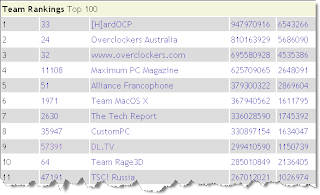Put your idle computer and games machine to work
When you are not using your computer or game machine, what are they doing? Just for the cost of electricity, you can contribute to worthy causes such as protein folding or searching for ET. Organizations from Stanford (Folding@home) and Berkley (SETI@home) have small programs that you can download for your computer, that will only run when your computer is idle. Folding@home and SETI@home are able to do this through using Grid Computing technology.
The Folding@home project started in 2000 with assistance from Intel, Google, and others.
Oh, and I had mentioned game machines too. Well using your PS3, you can also help with the Folding@home project. It's time we see the Xbox 360 on this list -- perhaps our old friend Bill can look into this.
The SETI@home project (Search for Extraterrestrial Intelligence) has been around since May of 1999, leveraging unused computing cycles to process data.
 Okay, so what does you computer or game machine do when you're not using it?
Okay, so what does you computer or game machine do when you're not using it?
The Folding@home project started in 2000 with assistance from Intel, Google, and others.
What is protein folding and how is folding linked to disease?So with the help of the Folding@home project, researchers are able to process data faster than ever before, in an effort to find cures for diseases such as Alzheimer's, Mad Cow (BSE), CJD, ALS, Huntington's, Parkinson's disease, and many Cancers and cancer-related syndromes. The Folding@home website has more information to help us understand the science behind folding.
Proteins are biology's workhorses -- its "nanomachines." Before proteins can carry out these important functions, they assemble themselves, or "fold." The process of protein folding, while critical and fundamental to virtually all of biology, in many ways remains a mystery.
Oh, and I had mentioned game machines too. Well using your PS3, you can also help with the Folding@home project. It's time we see the Xbox 360 on this list -- perhaps our old friend Bill can look into this.
The SETI@home project (Search for Extraterrestrial Intelligence) has been around since May of 1999, leveraging unused computing cycles to process data.
SETI (Search for Extraterrestrial Intelligence) is a scientific area whose goal is to detect intelligent life outside Earth. One approach, known as radio SETI, uses radio telescopes to listen for narrow-bandwidth radio signals from space. Such signals are not known to occur naturally, so a detection would provide evidence of extraterrestrial technology.Finally, both of these projects also monitor your stats and have various communities centered around them. For example, the DL.TV podcast provides a weekly update of their team rankings, and encourages their users to participate to help out-do other groups.
 Okay, so what does you computer or game machine do when you're not using it?
Okay, so what does you computer or game machine do when you're not using it?


Comments